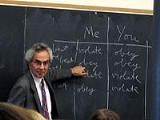
Thomas Nagel
Topics
Thomas Nagel
Quotations

Quotations
Thomas Nagel is Professor of Philosophy and Law at New York University.
Sourced
- I believe that there is a necessary connection in both directions between the physical and the mental, but that it cannot be discovered a priori. Opinion is strongly divided on the credibility of some kind of functionalist reductionism, and I won't go through my reasons for being on the antireductionist side of that debate. Despite significant attempts by a number of philosophers to describe the functional manifestations of conscious mental states, I continue to believe that no purely functionalist characterization of a system entails—simply in virtue of our mental concepts—that the system is conscious.
- "Conceiving the Impossible and the Mind-Body Problem," Royal Institute of Philosophy annual lecture, given in London on February 18, 1998, published in Philosophy vol. 73 no. 285, July 1998, pp 337-352, Cambridge University Press, p. 337.
- The problem is one of opposition between subjective and objective points of view. There is a tendency to seek an objective account of everything before admitting its reality. But often what appears to a more subjective point of view cannot be accounted for in this way. So either the objective conception of the world is incomplete, or the subjective involves illusions that should be rejected.
- "Subjective and Objective," in Mortal Questions, Cambridge University Press, 1979, p. 196.
- Eventually, I believe, current attempts to understand the mind by analogy with man-made computers that can perform superbly some of the same external tasks as conscious beings will be recognized as a gigantic waste of time.
- The View from Nowhere. New York, Oxford: Oxford University Press, 1986, p. 16., ISBN: 0195056442
- Everyone is entitled to commit murder in the imagination once in a while, not to mention lesser infractions.
- "Concealment and Exposure"
- If sub specie aeternitatis [from eternity's point of view] there is no reason to believe that anything matters, then that does not matter either, and we can approach our absurd lives with irony instead of heroism or despair.
- "The Absurd" in Mortal Questions, Cambridge University Press, 1979, p. 23
Silverdale Interactive © 2026. All Rights Reserved.

